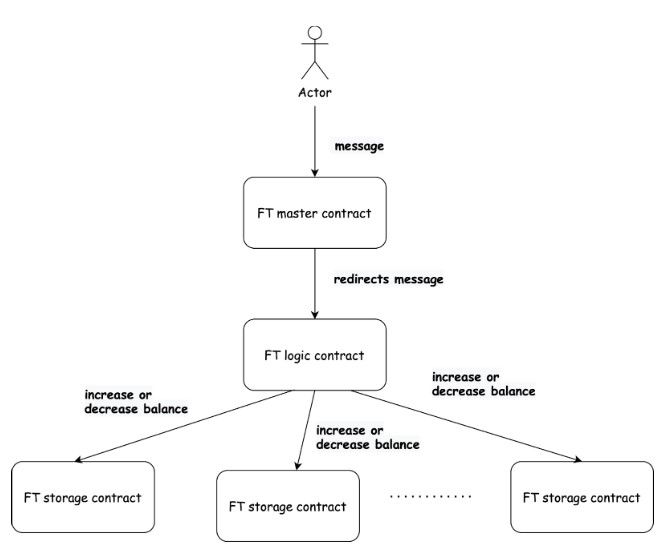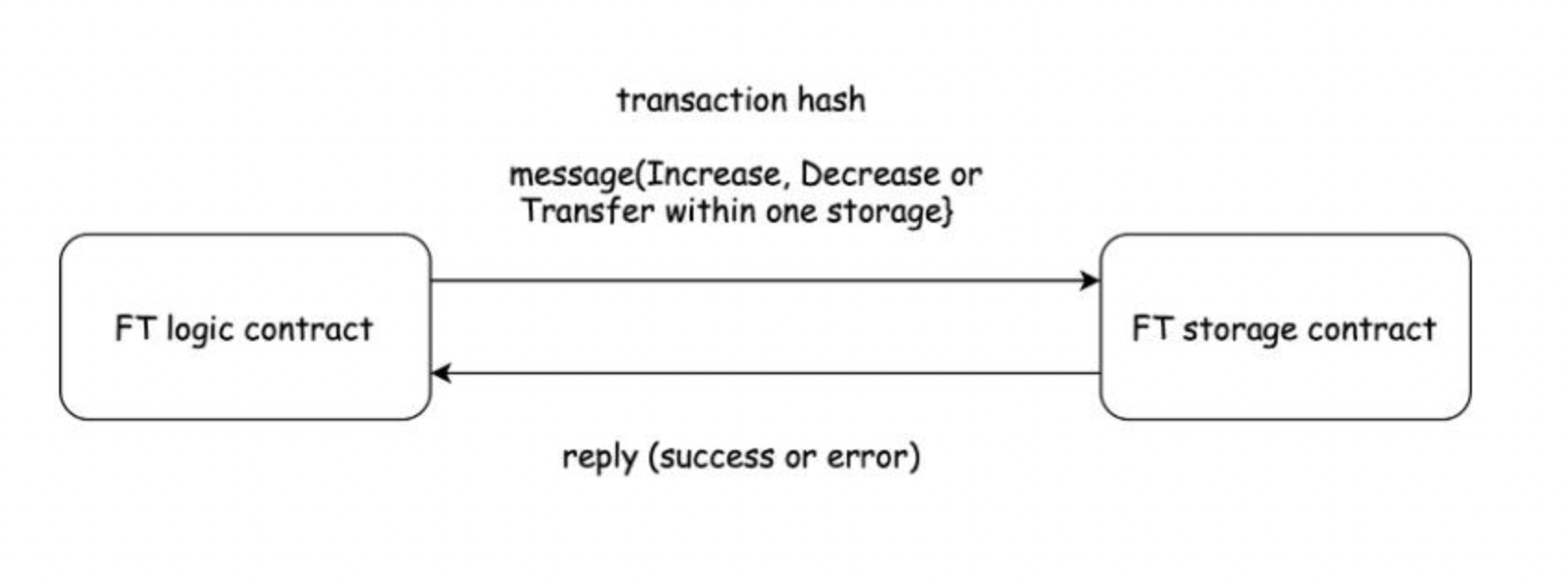Implementation of a fungible token on Gear
We propose dividing the fungible token into three contracts to improve its functionality and flexibility. Let's take a look at each contract:
- The Master fungible token acts as a proxy program redirecting messages to the logic contract.
- The Token Logic Contract handles the main standard token functions. By separating the logic into its own contract, we can easily add more functions without affecting the fungible token's address and contract state.
- Storage Contracts: These contracts securely store the users' balances.
To help you visualize the interaction between the contracts, take a look at the image below:

Storage contract architecture
The storage contract architecture consists of several crucial components. Let's break them down:
-
The Logic Contract Address: This field contains the address of the logic contract. The storage contract only processes messages from this specific address.
ft_logic_id: ActorId -
Executed Transactions: When the storage contract receives a message, it stores the hash of the transaction it's executing and keeps the results of the execution in the
Executedfield. IfExecutedis true, it indicates the successful execution of the message. Otherwise, ifExecutedis false, it shows an unsuccessful message execution.transaction_status: HashMap<H256, (Executed, Locked)> -
Account Balances: This field stores the balances of different accounts. It tracks the number of tokens held by each account.
balances: HashMap<ActorId, u128> -
Approvals of accounts: This field stores approvals accounts make. It enables one account to grant permission to another account to transfer its tokens. The approvals are stored in a nested structure.
approvals: HashMap<ActorId, HashMap<ActorId, u128>>
The storage contract can handle the following message types:
-
Increase Balance - increases the balance of a specific account. It adds tokens to the indicated account.
-
Decrease Balance - reduces the balance of a specific account. It deducts tokens from the indicated account.
-
Approve - an account can give another account permission to transfer its tokens. It establishes a trust relationship between the accounts.
-
Transfer - enables the transfer of tokens from one account to another. It is called from the logic contract when a token transfer occurs within the storage. Tokens move between the accounts involved.
-
Clear - removes the hash of an executed transaction. It helps maintain a clean record of transactions.
The storage contract doesn't make asynchronous calls, so its execution is atomic.
The logic contract architecture
The storage contract's execution is atomic, meaning it doesn't make asynchronous calls.
-
The master token contract address. The logic contract must execute messages only from that address.
ftoken_id: ActorId -
The transactions. As in the storage contract, the logic contract receives the hash of the transaction being executed and stores the result of its execution. Unlike the storage contract, where message executions are atomic, the logic contract has to keep track of the message being executed and its stage.
transactions: HashMap<H256, Transaction>The
Transactionis the following struct:pub struct Transaction {
msg_source: ActorId,
operation: Operation,
status: TransactionStatus,
}Where
msg_sourceis an account sending a message to the main contract. Operation is the action the logic contract should process, and status is the transaction status. It's the following enum:pub enum TransactionStatus {
InProgress,
Success,
Failure,
}InProgress- the transaction execution started;SuccessorFailure- the logic contract sends a response indicating whether the transaction has been successfully completed.
-
The code hash of the storage contract. The logic contract can create a new storage contract when it's necessary. The storage creation is implemented as follows:
- The logic contract takes the first letter of the account address. If the storage contract for this letter is created, it stores the account balance in this contract. If not, it creates a new storage contract
storage_code_hash: H256 -
The mapping from letters to the storage addresses.
id_to_storage: HashMap<String, ActorId>
The logic contract receives from the master contract the following message:
Message {
transaction_hash: H256,
account: ActorId,
payload: Vec<u8>,
}
The account is an actor who sends the message to the master contract. The payload is the encoded operation the logic contract has to process:
pub enum Operation {
Mint {
recipient: ActorId,
amount: u128,
},
Burn {
sender: ActorId,
amount: u128,
},
Transfer {
sender: ActorId,
recipient: ActorId,
amount: u128,
},
Approve {
approved_account: ActorId,
amount: u128,
},
}
When upgrading the logic contract, there may be changes to the enum Operation, meaning the payload structure may also change. As a result, the master contract does not know the specific type of payload structure and instead sends it as a byte array (Vec<u8>).
The logic contract sends only one message to the storage contract during the message Mint, Burn or Transfer between accounts in the same storage.
Upon receiving the message, the logic contract decodes the payload from a byte array into the expected enum Operation. This allows the logic contract to process the message based on the specific operation type (Mint, Burn or Transfer)

When the transfer occurs between 2 different storages, the contract acts as follows:
- The logic contract sends the
DecreaseBalancemessage to the storage contract. - If the message executes successfully, the logic contract sends the message
IncreaseBalanceto another storage contract. - If the
IncreaseBalancemessage executes successfully, the logic contract saves the status and responds to the main contract. The message execution should not fail. If a transaction is unsuccessful, it may be due to contract memory issues. The logic contract traces storage contracts and repeats failed transactions to prevent failure. In case of persistent errors, the system returns the balance.
The transaction must be re-run if the message fails due to the lack of gas.
The master contract architecture
The state of the master contract includes the following fields:
-
The address of the contract admin - has the right to upgrade the logic contract.
admin: ActorId -
The address of the logic contract.
ft_logic_id: ActorId -
The transaction history.
transactions: HashMap<H256, TransactionStatus>Where the
TransactionStatus:pub enum TransactionStatus {
InProgress,
Success,
Failure,
}
The contract receives a message from an account with a specific nonce, which is used to compute the transaction hash and the account address.
The user must actively keep track of their nonce and increment it with each subsequent transaction. Alternatively, the contract can be designed to automatically track the user's nonce, rendering the nonce field optional.
The main contract forwards the message to the logic contract, indicating the sending account.